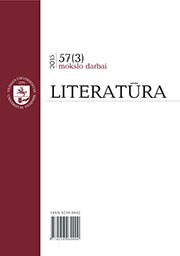DAIMONOLOGIJA APULĖJAUS VEIKALE DE DEO SOCRATIS
DAEMONOLOGY IN APULEIUS’ DE DEO SOCRATIS
Author(s): Alius JaskelevičiusSubject(s): Philosophy, Language and Literature Studies, Studies of Literature, Ancient Philosphy, Theory of Literature
Published by: Vilniaus Universiteto Leidykla
Keywords: Apuleius; daemonology; Middle Platonism; mediator
Summary/Abstract: Apuleius’ work De deo Socratis analyses the subject of daemon’s so popular in the thought of Middle Platonism. Apuleius’ work is exceptional in the sense that it presents a comprehensive general theory of daemons as intermediate beings as well as portraying the author’s personal attitudes. In combining philosophical and literary styles, Apuleius purposefully sets out to, on the one hand, emphasise the cosmological and theological aspect of daemonic theory and, on the other hand, to transition from theoretical statements to practical commitments.This means that the final part of De deo Socratis distances itself from the analysis of daemonic theory and moves on to analysing personal commitment to philosophy. This transition is marked by the entrance of Socrates’ figure in place of the previously dominant figure of Plato and his narration. Apuleius’ De deo Socratis is an important work that takes its place in between Greek daemonology and Latin numinology. It is an important fact of one culture shifting its contents to another cultural context and proof of how such a transition can be possible.
Journal: Literatūra
- Issue Year: 57/2015
- Issue No: 3
- Page Range: 71-83
- Page Count: 13
- Language: Lithuanian

